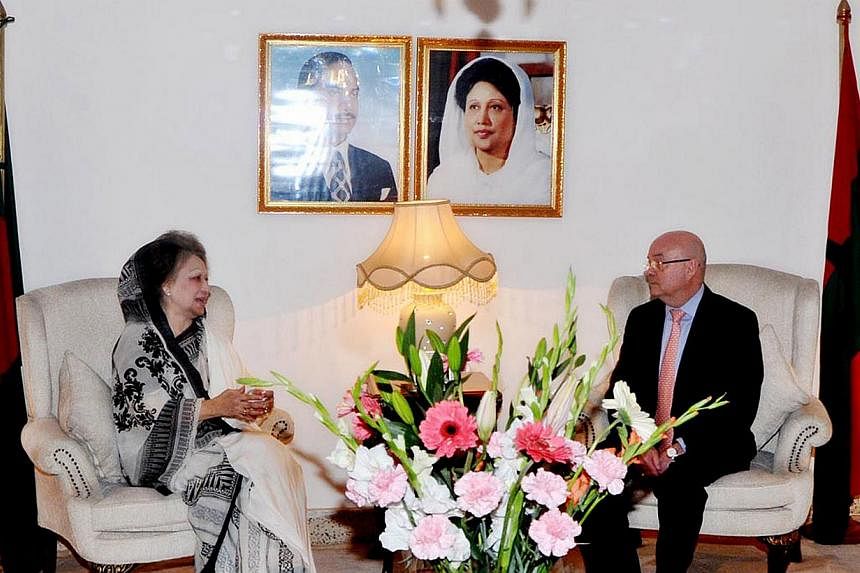DHAKA (AFP) - She has been stuck in her office for 40 days and slapped with a series of charges over the deadly violence outside, but Bangladesh's opposition leader Khaleda Zia says she and her arch enemy Sheikh Hasina can still reach a deal to end the turmoil.
In an exclusive interview with AFP, Bangladesh Nationalist Party (BNP) leader Zia accused Prime Minister Hasina of killing democracy and the ruling Awami League of being behind the violence that has killed scores since the turn of the year. But she also stressed her desire to reach a consensus to pull the country back from the brink, even if it meant talking to her nemesis.
Since then Bangladesh has witnessed an upsurge of violence that has revived memories of the bloody build-up to Ms Hasina's controversial walkover re-election on Jan 5 last year in which more than 100 people died.
In her first interview with the foreign media since her confinement, Ms Zia said she feared the bloodshed would get worse unless the two women could agree on a way to contest new elections under a neutral caretaker government. "Every conscious and conscientious person in Bangladesh knows that the only way to resolve the current political crisis is to hold an inclusive, competitive and meaningful election," Ms Zia told AFP by phone on Wednesday. "The more quickly it can be arranged, the better it is for everyone. If it is delayed, the crisis could become even more complex."
Ms Zia, who has twice served as prime minister, has not set foot outside her offices in downtown Dhaka ever since the security forces barricaded her compound on Jan 3 to prevent the 69-year-old from spearheading a mass pro-democracy protest.
Ms Zia's BNP and 19 other opposition parties boycotted last year's election, arguing that it could not be fair if its organisation was overseen by Ms Hasina.
In her interview, she reiterated long-standing demands for Ms Hasina to step aside and allow elections to take place under a "neutral" government but significantly, she acknowledged that there was room for argument and compromise.
"We've not said others have to agree what we've proposed. It should be based on the consensus of all parties and through talks," she said.
"We have said a fair election should be held based on consensus of all (parties) and through talks. We want that.
"We also have to make some decisions on the election commission, administration and electoral rules so that a level playing field is created for all the parties."
Ms Zia said that proposals that have been put forward to Ms Hasina's camp but so far "we've not heard anything from them".
More than 80 people have been killed in political violence since Jan 3. Many of the victims have died in firebombings of buses and trucks since Ms Zia ordered her supporters to stage a transport blockade that is in its sixth week.
Ms Hasina has said she will not deal with "terrorists" or "murderers", comparing the arson deaths to the recent killing of a Jordanian pilot by the Islamic State in Iraq and Syria.
Ms Zia herself was charged last week with "instigating" one of the deadly firebombings in which eight people were killed, in addition to earlier corruption charges.
But Ms Zia said the arson attacks appeared to be the work of Hasina's Awami League and that "they are putting the blame on us".
The tit-for-tat accusation was an illustration of the deep-rooted distrust between the two sides that makes the prospects of an agreement so tricky.
However there are signs of growing international pressure on both sides to put their heads together.
British High Commissioner Robert Gibson became the first senior Western diplomat to meet Ms Zia since the start of her confinement on Wednesday, when he urged "all parties to consider confidence building measures that would defuse the current tension".
Although there were widespread calls for Ms Hasina to stage fresh elections in the aftermath of last year's effective one-horse race, those calls have been more muted in recent months.
Ms Zia welcomed the prospect of greater international pressure on Ms Hasina to open talks.
"The world community should put stronger and more effective pressure (on the government) for compromise and dialogue," she said.
"The United Nations should again take the initiative in this regard (to hold dialogue)... other nations should also come forward to resolve the crisis."
Ms Zia and Ms Hasina have a notoriously poisonous relationship after ruling the former East Pakistan for much of last 25 years, and are known as the "Battling Begums".
The country, which only gained independence in 1971 after a vicious war of secession, has seen around 20 coups in its short history.
Ms Zia said that despite the current crisis, the desire for democracy was as strong as ever among the Bangladeshi people.
"Bangladesh people want democracy. Even a rickshaw puller knows what democracy is," she said.

